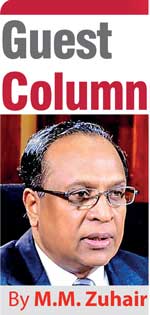Wednesday Feb 25, 2026
Wednesday Feb 25, 2026
Saturday, 23 September 2023 00:01 - - {{hitsCtrl.values.hits}}

The new law can step in to lock up the protest leaders for at least a year, with the State having only to allege ‘intimidation and causing simple hurt’
 The Counter Terrorism Bill, originally gazetted six years ago on 17 September 2017 and then abandoned due to strong public criticism, has been re-gazetted on Friday 15 September 2023, re-named ‘Anti-Terrorism’ Bill, with some insignificant amendments, with provisions more draconian than in the controversial Prevention of Terrorism (Temporary Provisions) Act No. 48 of 1979 (PTA).
The Counter Terrorism Bill, originally gazetted six years ago on 17 September 2017 and then abandoned due to strong public criticism, has been re-gazetted on Friday 15 September 2023, re-named ‘Anti-Terrorism’ Bill, with some insignificant amendments, with provisions more draconian than in the controversial Prevention of Terrorism (Temporary Provisions) Act No. 48 of 1979 (PTA).
A debt stricken Sri Lanka is now being displayed to the world as wanting to counter foreign investments, tourism, exports, etc. by declaring to the world that Sri Lanka is badly in need of more serious terror laws to confront ‘future aragalayas’, the ‘troubling media’, the ‘terrorist Muslims’, the ‘impossible diaspora’ and the ‘insubordinate Church’, a formidable list of current and future terrorists!
Terrorism is loosely defined and broadened without boundaries in section 3 of the bill. Section 2 of the PTA, currently in operation, had 10 accurately defined offences, restricted as against the offences in the Penal Code, to causing the death of, attacks on or criminal intimidation of ‘specified persons’ listed in the Act and ‘witnesses’ to offences under the PTA; kidnapping or abduction of witnesses; robbery or mischief of State property, illegal import of arms or ammunition, harbouring PTA offenders, etc.
Significantly the re-gazetted Anti-Terrorism Bill in section 3(1), creating the offence of terrorism has not limited ‘terrorism’ to any “illegal” act but vaguely extends to “any act” or “illegal omissions”. Furthermore unlike in the PTA, section 3(1)(a) of the Bill is overbroad in that the phrase “criminal intimidation” of “any specified person or a witness” have been dropped and the phrase “intimidating the public or a section of the public” have been brought in, unduly and vaguely broadening the category.
A legitimate protest march by farmers for instance demanding fertilisers could end up with the leaders of the protest march being arrested for ‘intimidating a section of the public’ and “causing hurt” under section 3(2) to an undefined person in the protest march! PTA had provided for causing ‘grievous hurt’ to a specified person or witness. But this Bill has broadened the category into causing simple ‘hurt’ as an act of terrorism! The new law can step in to lock up the protest leaders for at least a year, with the State having only to allege ‘intimidation and causing simple hurt’!
Section 3(1)(b) of the Bill is more draconian! PTA did not have any offence that related to the ‘Government’ per se, meaning the President, the Cabinet of Ministers and the rest of the executive. But the Bill has included the commission of “an act” “wrongfully or unlawfully compelling the Government of Sri Lanka or any other Government or an international organisation to do or to abstain from doing any act” as committing the offence of terrorism!
If for instance, India drops “parippu” or its armed forces enters North-East Sri Lanka whether by force or by coercing or intimidating the Government of Sri Lanka into wrongfully and unlawfully agreeing to allow the Indian forces to enter and remain therein as it happened in 1987, then Sri Lankans launching any protest against the invasion of one’s country, could be locked up as ‘terrorists’ under the proposed law!
Remember the George Bush and Tony Blair invasion of Iraq in March 2003 alleging falsely that Saddam Hussain possessed ‘Weapons of Mass Destruction’! It is more likely this provision will also facilitate the unsolicited entry of US forces into Sri Lanka, under the pretext of containing China, once the Russian-NATO war in Ukraine is over before end 2025! All signals are in place for such an occurrence, a view that cannot be expressed once this Bill becomes law!
There are in the Bill many more draconian provisions, which instead of regulating the security apparatus, seek to over-empower them at the cost of the liberty of the subject.
(The writer is a former MP.)